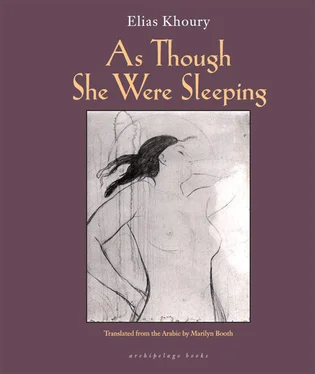Milia spent three days with her husband in the empty hotel. The only people there were Khawaja Massabki and those two women of his. There was the tiny pond in the hotel garden, mounded with snow, and Mansour’s voice reciting poetry to her as he gripped her hand, pointing out certain photographs on the wall of the empty reception hall.
This one’s the king, and next to him is the prince of poets Ahmad Shawqi, said Mansour. The king fled when the French attacked Syria, and he set himself up as king over Iraq. What a joke — did you ever in your life hear of a king who betrayed his kingdom and got a second kingdom? But that’s us for you! Ahmad Shawqi stood weeping over Syria, which the French army had bombarded with heavy guns.
Greetings softer than Barada’s east wind
to you, my Damascus, with love I send
and tears and tears that never end
Milia lies between wakefulness and sleep. She feels fire in her bones. She goes out into the garden and thrusts her hand into the snow and brings it up to her mouth and swallows the soft white stuff. The snow melts against her burning lips and thirst stalks her. She sleeps next to Mansour in one bed. The man takes her with his powerful hands. She dozes in fire, and dreams. But little Milia will not return until three months have passed. Her place is taken by a woman of twenty-four stretched out over the fog of Dahr el-Baydar, going into a shadowy world, led to its gates by a blue woman whom she does not know.
AND THERE WAS DARKNESS.
Milia was in bed and in pain. The pain pincered her lower body and shot upward. She could not breathe. A fisted hand plunged into her lower parts and tugged. Her body seemed paralyzed and her head was heavy. She opened her eyes but saw nothing. The pain ebbed, as though diffusing and spreading along her belly before it melted away to leave behind an evanescent memory.
The nine months had passed. The time was come.
The pain returns. Her belly convulses and with that appears her grandmother Umm Yusuf. Why has this grandmother dropped from her memory? And why, today, does she return?
White hair in a tight bun clustered against the nape of the old woman’s neck. She reclines in bed, mute and paralyzed. An ancient cat hovers nearby but dares not jump up to snuggle next to her in bed. It is Umm Yusuf — by her premotherhood name, Hasiba Haddad — who died when Milia was three years old and was erased from the girl’s memory, or perhaps she never actually entered Milia’s memory in the first place. Why does she return today? And why the cat?
Milia awakened, her eyes flashing open to the morning rays. She swung her feet out of bed, setting them down into her slippers as usual. The cat jumped between her legs and the slippers turned into a bounding cat. She chased after it, cornered it, crept toward it, and put her feet on it, hearing a meow that was more like a rattle. She saw her grandmother, Hasiba, whose name originally had been Habisa. Preferring not to be known as “Imprisoned One,” she had switched two letters around and called herself Hasiba. Much better to be thought of as one respected!
Saadeh did not understand why Abu Said had given this name, Habisa, to his daughter. Perhaps it had been the name of the daughter’s own grandmother, but then why had that grandmother gotten the name? In any case, the woman had changed her own name and everyone began calling her by the new one — everyone except her daughter-in-law. Even after Hasiba’s death Saadeh went on calling her by her original given name. Distressed by it, Yusuf would beg his wife in a shaking voice to stop, but Saadeh was Saadeh.
I want to call her Sitti Hasiba, Milia said to her mother.
Call her whatever you want, my dear, but her name is Habisa. God has released her, and released us, and released the cat, too, and in one fell swoop!
What was the story of the cat of whom it was rumored that Saadeh had poisoned twenty-four hours after the death of her mother-in-law? Milia did not remember her father’s tears but Saadeh did. He cried over that cat more than he did over his own mother, she said.
Grandmother had given the cat the name Pasha because she said he looked like the Turkish pashas: light yellow hair, brown eyes, long whiskers, and a body as fat as a sheep’s. He was old and had an eye problem — glaucoma, most likely, for he was nearly blind. But Saadeh said his stumbling walk wasn’t because of his blindness. It was because he was senile and couldn’t tell the difference between one object and another. Instead of behaving with typical feline modesty, he did his business everywhere and filled the house with the smell of shit. Saadeh wanted to throw him out but Yusuf felt sorry for his invalid mother and gave the cat his patriarchal protection, ordering that Pasha be allowed to stay in the house.
He pleaded with Saadeh. Mother is going mad, he said.
She’s already mad.
God be kind in your afterlife, woman, don’t say that! I’ll clean up after the cat.
And your mother — who cleans up after her?
Lower your voice! She’ll hear you.
Grandmother sat in bed listening to everything and saying nothing. She had already entered the desert of silence and would never find her way out. Milia did not know where the expression had originated; it must have been the nun’s. The saintly woman labeled Hasiba’s silence the desert . All saints chose the desert at the end, she said. And the only person who showed reverence and respect to Hasiba was Sister Milana. Arriving at the house, she would go directly to the old woman’s bed, sponge her brow with a cotton wad that had been immersed in blessed oil, give her a kiss on the top of her head, and refrain from showing any disgust at the smell coming out of the old woman’s cracked skin.
Was Sitti born paralyzed? asked Milia.
No, my dear. When she was born, your grandmother had nothing wrong with her. She slept on this bed right here, next to the one you were born on. But she didn’t sit at home much. She was always going about. When you were about five months old, one day they brought her in and said she had fallen, out on the road. She was never the same again, until she died.
And when she died, where was I sleeping?
You were with her, sleeping in the very same room, but we didn’t let you know anything, you and your brothers. Except Salim, who came into our room and said his grandmama was frozen. I ran to her — your father stayed in bed, unable to move, until I screamed and he came after me. We sent all of you children to my mother and you didn’t come back home until after everything was over and we had buried the cat as well.
Milia did not remember her grandmother. Whatever images of the elderly woman did come to her came from the memory of words heard from her mother, fragments of stories gathered from a scattering of words to become images that had their place in her dreams.
I must let go of this dream, Milia said. She stood up, opened the door to her room, and begged the cat to come, but the cat ran and crouched under the bed and began to meow. Milia knelt down and made kissing sounds. The old cat lifted his head but his body shrank back as if he were getting ready to pounce. Her fear pushed little Milia into retreat. He was beneath her bed in the liwan . The grandmother watched, her head bowed forward onto pillows set on her thighs, her eyes open. The woman was bent almost double; she could not straighten her body.
Why does she sleep like that? Milia wondered. Now she could see only the old woman’s back, her pale cheek turned sideways on the pillow, white froth around her lips that were always shut, always silent. That is how she spent her final three years.
The story goes that Yusuf got up one morning to find his mother asleep in this odd position. His mother told him she had decided to sleep bent over to keep death at a distance. If I sleep on my back, she warned, the Angel of Death will come and steal my soul from inside me.
Читать дальше












